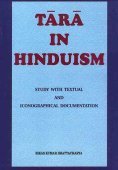Black magic: 2 definitions
Introduction:
Black magic means something in Hinduism, Sanskrit, the history of ancient India. If you want to know the exact meaning, history, etymology or English translation of this term then check out the descriptions on this page. Add your comment or reference to a book if you want to contribute to this summary article.
In Hinduism
Shaktism (Shakta philosophy)
Source: Google books: Genesis and Development of Tantra (Shaktism)Black Magic (or Sorcery) is denoted by the Sanskrit term Abhicāra and represents one of the various Supernatural Powers (siddhi) according to the Siddhayogeśvarīmata: an ancient Sanskrit text devoted to cults of Goddesses as the Vidyāpīṭha or Vidyā Corpus.—In the Siddhayogeśvarīmata, the objectives of rituals are classified as siddhis [e.g., twelve kinds of black magic (abhicāras) listed in chapter 24]. They belong to the category of supernatural phenomena and seem to be considerably different from the types of wish people expected to gain from the Vedic rituals that still remained within the sphere of everyday life.

Shakta (शाक्त, śākta) or Shaktism (śāktism) represents a tradition of Hinduism where the Goddess (Devi) is revered and worshipped. Shakta literature includes a range of scriptures, including various Agamas and Tantras, although its roots may be traced back to the Vedas.
India history and geography
Source: Singhi Jain Series: Ratnaprabha-suri’s Kuvalayamala-katha (history)Black Magic refers to one of the seventy-two arts and sixty-four sciences, being part of the Ancient Indian Education, as depicted in the Kathās (narrative poems) such as Uddyotanasūri in his 8th-century Kuvalayamālā (a Prakrit Campū, similar to Kāvya poetry).—Page 150.17 f. & 151.1-5: There is described an educational institution. [...] At another place (151.6-11) the prince came across persons who cultivated the seventy-two arts and sixty-four sciences, such as, [e.g., Black magic], [...].

The history of India traces the identification of countries, villages, towns and other regions of India, as well as mythology, zoology, royal dynasties, rulers, tribes, local festivities and traditions and regional languages. Ancient India enjoyed religious freedom and encourages the path of Dharma, a concept common to Buddhism, Hinduism, and Jainism.
See also (Relevant definitions)
Partial matches: Magic, Black.
Full-text (+83): Abhicara, Marana, Cede, Jatagara, Jatagati, Aindrajaal, Bhanamati, Muttasa, Karumanam, Karunul, Maranamamtra, Kuttiravittai, Harimekhale, Calliyakkaru, Mantrasiddhi, Kanmaya, Mamtara, Jalagati, Mamtragarike, Kritye.
Relevant text
Search found 46 books and stories containing Black magic; (plurals include: Black magics). You can also click to the full overview containing English textual excerpts. Below are direct links for the most relevant articles:
Kathasaritsagara (the Ocean of Story) (by Somadeva)
On the connection of Tantra with Black magic < [Notes]
Conclusion of King Trivikramasena and the Mendicant < [Appendix 6.1 - The Twenty-five Tales of a Vetāla]
On the repeating of prayers, verses or charms backwards < [Notes]
Dvisahasri of Tembesvami (Summary and Study) (by Upadhyay Mihirkumar Sudhirbhai)
Works of Dattātreya < [Introduction]
The Authority < [April – June 1992]
Sacrifice < [December 1939]
Resurgence of the Native: The Thematic Paradigm in the Short Fiction of Nguri Wa Thiongo < [July – September, 1997]
The Bhagavata Purana (by G. V. Tagare)
Chapter 10 - Dhruva invades Alakā < [Book 4 - Fourth Skandha]
Chapter 19 - Varāha kills Hiraṇyākṣa < [Book 3 - Third Skandha]
Chapter 66 - Slaying of Pauṇḍraka and others < [Book 10 - Tenth Skandha]
Dasarupaka (critical study) (by Anuru Ranjan Mishra)
Part 13 - Status of Women in the Līlāvatī-Vīthī < [Chapter 7 - Vīthī (critical study)]
Part 12 - Society in the Rukmiṇīharaṇa < [Chapter 9 - Īhāmṛga (critical study)]
Part 9 - Sentiments (rasa) used in a Vīthī < [Chapter 7 - Vīthī (critical study)]
Diaspora of Bhuta (Daiva) worshipping cult—India and Indonesia (by Shilpa V. Sonawane)
Part 3.2 - Barong and Rangda Mythology < [Chapter 4 - Inter-Disciplinary Analysis]
Part 6.3 - Association with Tantra < [Chapter 4 - Inter-Disciplinary Analysis]
Part 11.2 - The History of Animism in Indonesia < [Chapter 1 - Introduction]
Related products

